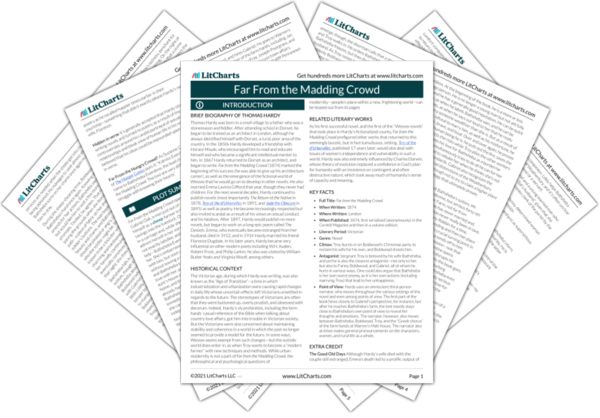Summary
Analysis
Bathsheba tells Gabriel that she wants only a private, secret, plain wedding. A few nights later, then, he sneaks out to fetch a license, and meets Coggan, whom he decides to trust with the secret that he and Bathsheba are getting married the next morning. He wouldn’t have wanted secrecy, but circumstances make a loud wedding inappropriate. Bathsheba doesn’t want the whole parish ogling her.
Although Gabriel would prefer another kind of wedding, he continues to put Bathsheba’s wishes above his own: knowing her as well as he does, he recognizes her aversion to local gossip, something that as mistress of the farm she has constantly had to battle.
Themes
Coggan says that the wife of Laban Tall, who’s the new clerk of the parish, will spread the news around everywhere before morning. He says that he’ll ask to speak to Laban outside the door—his wife will never guess. But Tall isn’t at home, so Coggan makes up a story about a farm share agreement, saying it’s vital that he must come to the church the next morning.
Coggan, too, knows that news travels quickly in Weatherbury—especially when Susan Tall, Laban Tall’s wife, is concerned. Coggan’s plan functions as another comic touch within a more serious romantic mode.
Themes
Bathsheba, meanwhile, can’t sleep past four, and finally fetches Liddy at six to give her hair a brushing. Only then does she tell Liddy that Farmer Gabriel is coming to dine today. When Liddy is dubious about the morals of that, Bathsheba whispers the news to her, and Liddy exclaims in joy. Near ten, Gabriel knocks on Bathsheba’s door, and the two move through the mist and fog with umbrellas to the church yard, arm in arm for the first time in their lives. In the church are Tall, Liddy, and the parson, and the deed is soon accomplished.
Bathsheba doesn’t share the news of her wedding even with Liddy until the last moment—after so much pain and suffering, Liddy now has a chance to rejoice at a piece of information from her mistress. The wedding contrasts sharply to the drunken harvest supper over which Troy reigned, and indeed given all that she’s experienced, Bathsheba doesn’t feel like she has the right to such celebration.
Themes
That evening the couple sits down to tea in Bathsheba’s parlor, where they’ve decided to live. Just then they hear a cannon and trumpets: they go to the porch and hear a great clang of instruments: Mark Clark and Jan Coggan have enlisted the village to perform. Clark wishes long life to the couple, and Gabriel thanks them. The others tease him for the naturalness with which he says, “my wife,” though they say it needs to be a little chillier—that will come with joy. Bathsheba doesn’t laugh much anymore, but she smiles, and Poorgrass cheerfully makes a gloss on the affair.
Bathsheba continues to want to pay the price for her actions, refusing grand ceremonies and celebrations: the story’s happy ending is mitigated to a certain extent by the deaths that will continue to hang over her head, not to mention Boldwood’s lifelong imprisonment. But the villagers’ joviality allows the book to end on an upward, more comic bent, reflecting the dual tragic and comic bent of the novel.
Themes
Get the entire Madding Crowd LitChart as a printable PDF.













